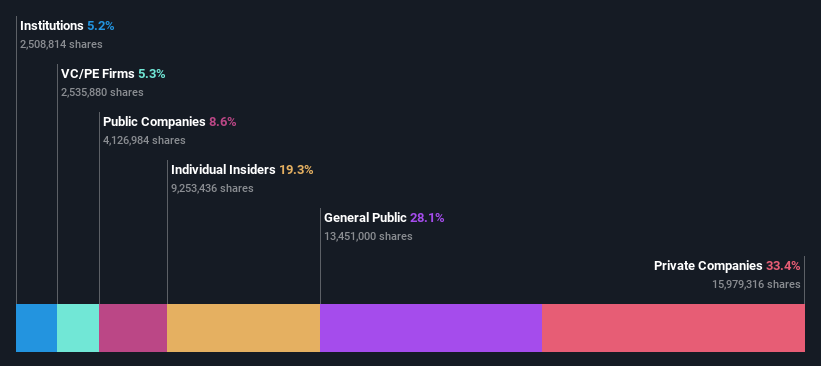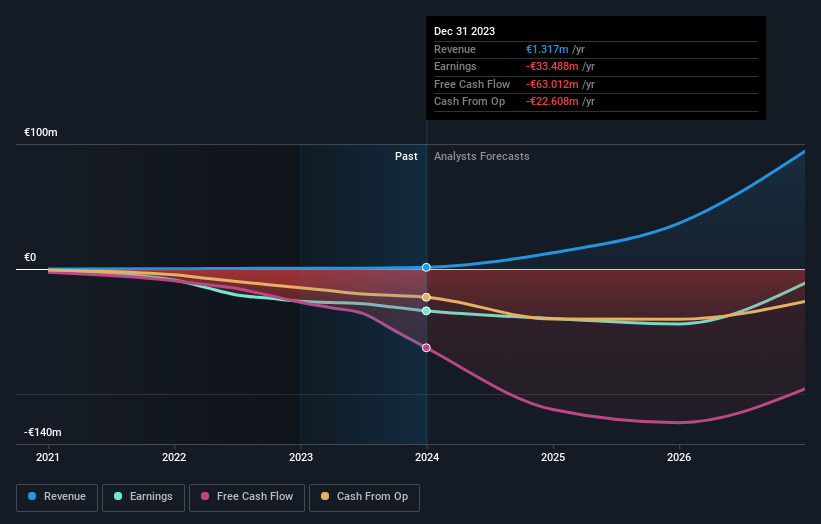- France
- /
- Oil and Gas
- /
- ENXTPA:LHYFE
Private companies invested in Lhyfe SA (EPA:LHYFE) copped the brunt of last week's €29m market cap decline
Key Insights
- Lhyfe's significant private companies ownership suggests that the key decisions are influenced by shareholders from the larger public
- 52% of the business is held by the top 4 shareholders
- Insiders own 19% of Lhyfe
A look at the shareholders of Lhyfe SA (EPA:LHYFE) can tell us which group is most powerful. With 33% stake, private companies possess the maximum shares in the company. In other words, the group stands to gain the most (or lose the most) from their investment into the company.
As market cap fell to €176m last week, private companies would have faced the highest losses than any other shareholder groups of the company.
Let's delve deeper into each type of owner of Lhyfe, beginning with the chart below.
Check out our latest analysis for Lhyfe

What Does The Institutional Ownership Tell Us About Lhyfe?
Many institutions measure their performance against an index that approximates the local market. So they usually pay more attention to companies that are included in major indices.
We can see that Lhyfe does have institutional investors; and they hold a good portion of the company's stock. This suggests some credibility amongst professional investors. But we can't rely on that fact alone since institutions make bad investments sometimes, just like everyone does. It is not uncommon to see a big share price drop if two large institutional investors try to sell out of a stock at the same time. So it is worth checking the past earnings trajectory of Lhyfe, (below). Of course, keep in mind that there are other factors to consider, too.

We note that hedge funds don't have a meaningful investment in Lhyfe. With a 19% stake, CEO Matthieu Guesné is the largest shareholder. Meanwhile, the second and third largest shareholders, hold 16% and 9.8%, of the shares outstanding, respectively.
Our research also brought to light the fact that roughly 52% of the company is controlled by the top 4 shareholders suggesting that these owners wield significant influence on the business.
While studying institutional ownership for a company can add value to your research, it is also a good practice to research analyst recommendations to get a deeper understand of a stock's expected performance. There is some analyst coverage of the stock, but it could still become more well known, with time.
Insider Ownership Of Lhyfe
The definition of an insider can differ slightly between different countries, but members of the board of directors always count. Company management run the business, but the CEO will answer to the board, even if he or she is a member of it.
Most consider insider ownership a positive because it can indicate the board is well aligned with other shareholders. However, on some occasions too much power is concentrated within this group.
It seems insiders own a significant proportion of Lhyfe SA. Insiders have a €34m stake in this €176m business. We would say this shows alignment with shareholders, but it is worth noting that the company is still quite small; some insiders may have founded the business. You can click here to see if those insiders have been buying or selling.
General Public Ownership
The general public-- including retail investors -- own 28% stake in the company, and hence can't easily be ignored. While this size of ownership may not be enough to sway a policy decision in their favour, they can still make a collective impact on company policies.
Private Equity Ownership
Private equity firms hold a 5.3% stake in Lhyfe. This suggests they can be influential in key policy decisions. Sometimes we see private equity stick around for the long term, but generally speaking they have a shorter investment horizon and -- as the name suggests -- don't invest in public companies much. After some time they may look to sell and redeploy capital elsewhere.
Private Company Ownership
It seems that Private Companies own 33%, of the Lhyfe stock. It's hard to draw any conclusions from this fact alone, so its worth looking into who owns those private companies. Sometimes insiders or other related parties have an interest in shares in a public company through a separate private company.
Public Company Ownership
It appears to us that public companies own 8.6% of Lhyfe. We can't be certain but it is quite possible this is a strategic stake. The businesses may be similar, or work together.
Next Steps:
I find it very interesting to look at who exactly owns a company. But to truly gain insight, we need to consider other information, too. For example, we've discovered 3 warning signs for Lhyfe that you should be aware of before investing here.
If you are like me, you may want to think about whether this company will grow or shrink. Luckily, you can check this free report showing analyst forecasts for its future.
NB: Figures in this article are calculated using data from the last twelve months, which refer to the 12-month period ending on the last date of the month the financial statement is dated. This may not be consistent with full year annual report figures.
New: AI Stock Screener & Alerts
Our new AI Stock Screener scans the market every day to uncover opportunities.
• Dividend Powerhouses (3%+ Yield)
• Undervalued Small Caps with Insider Buying
• High growth Tech and AI Companies
Or build your own from over 50 metrics.
Have feedback on this article? Concerned about the content? Get in touch with us directly. Alternatively, email editorial-team (at) simplywallst.com.
This article by Simply Wall St is general in nature. We provide commentary based on historical data and analyst forecasts only using an unbiased methodology and our articles are not intended to be financial advice. It does not constitute a recommendation to buy or sell any stock, and does not take account of your objectives, or your financial situation. We aim to bring you long-term focused analysis driven by fundamental data. Note that our analysis may not factor in the latest price-sensitive company announcements or qualitative material. Simply Wall St has no position in any stocks mentioned.
Have feedback on this article? Concerned about the content? Get in touch with us directly. Alternatively, email editorial-team@simplywallst.com
About ENXTPA:LHYFE
Lhyfe
Produces and supplies renewable green hydrogen for mobility and industry markets.
Excellent balance sheet with limited growth.
Market Insights
Community Narratives



